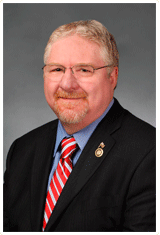Last session, the Missouri Legislature passed a measure requiring social workers in-training to work with a licensed social worker for a certain period of time before they could receive their master’s degree. We did this to ensure that social workers in our state are given real-world experience in the field before practicing on their own. Social work is an incredibly difficult field to work in, and we want to guarantee that those who do these jobs in the state meet certain standards.
Since then, there have been a couple of cases where social workers in-training have tried to acquire the necessary hours on their own. This year, I sponsored Senate Bill 808, which tightens the original bill so that all individuals working toward a master’s degree in social work must work under a licensed social worker. The legislation ensures the intent of the original law is upheld and social workers in the state meet the required standards we’ve set forth.
Additionally, the measure addresses the number of hours of experience a social worker must have to be licensed by the State Committee for Social Workers. There are currently six states in the nation that require 4,000 hours of experience for licensure. Missouri only requires 3,000. Senate Bill 808 would give individuals the option to meet the 4,000-hour requirement to work in other states by allowing Missouri to accredit the additional 1,000 hours.
The legislation also does a number of other things. It adds to the description of the “practice of pharmacy” the administration of a number of vaccines under authorization of a physician. Pharmacists must administer the vaccines under the treatment guidelines of the Centers for Disease Control and Prevention and rules under the Board of Pharmacy and the State Board of Registration for Healing Arts.
It’s important the administration of these vaccinations is subject to very strict guidelines. Within 14 days of giving the shot, the pharmacist would have to provide specified information to the patient’s primary health care provider.
It’s very common now for hospitals to have their own pharmacies. These are generally known as Class B hospital pharmacies, and they provide a degree of convenience so patients released can just pick up their medications before going home. However, not all of these pharmacies are under the inspection authority of the Department of Health and Senior Services.
Senate Bill 808 gives the state Board of Pharmacy the authority to inspect these hospital pharmacies, and collaborate with the Department of Health and Senior Services to create rules regarding medication services provided by pharmacists at these types of pharmacies.
Finally, the bill requires hearing instrument specialists to successfully pass a qualifying exam in order to obtain a license; allows a physician assistant to enroll with the Department of Social Services as a Medicaid provider while acting under a supervision agreement with a physician; and requires individuals who practice combing, braiding, or curling of hair without the use of harsh chemicals to not be subject to cosmetology licensing requirements while working with a licensee for a public amusement or entertainment venue, such as artists at music festivals.
Ultimately, the bill strengthens many of the public protections we put in place to ensure those who practice certain professions in the state are held to high standards and the necessary requirements for licensure.
Senate Bill 808 was given final approval by the Senate this week. It now goes to the governor’s desk.
If you have any questions or comments about this or any other matter regarding your state government, please feel free to contact me at (573) 751-1503; you are also welcome to e-mail me at jay.wasson@senate.mo.gov. |



